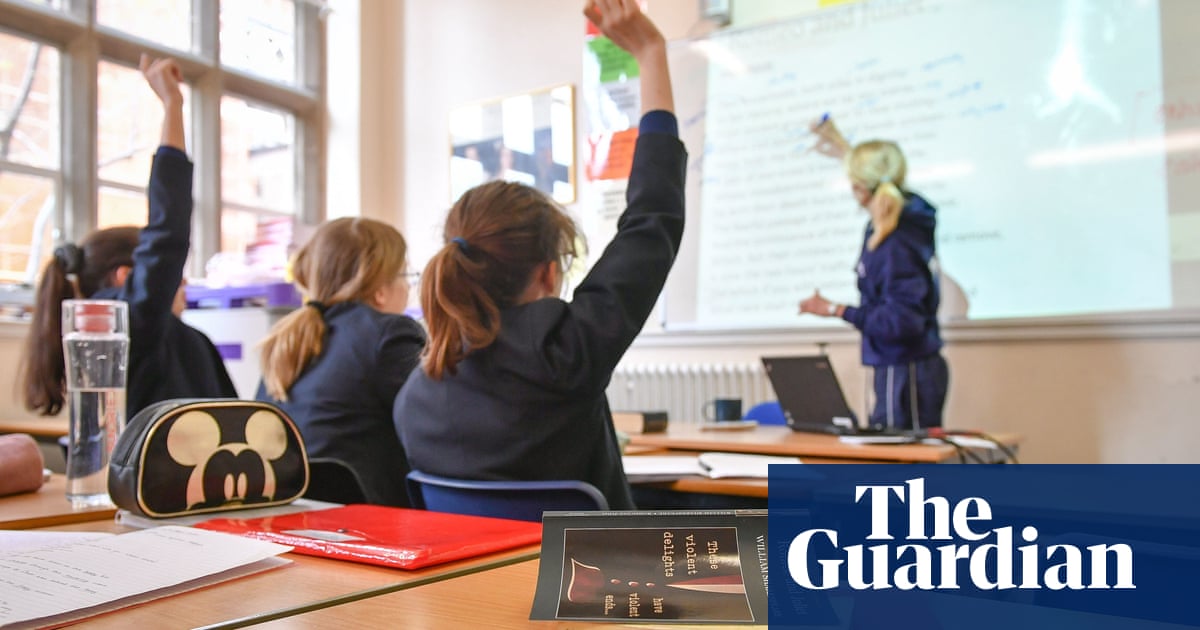Children will be taught how to spot extremist content and misinformation online under planned changes to the school curriculum, the education secretary said.
Bridget Phillipson said she was launching a review of the curriculum in primary and secondary schools to embed critical thinking across multiple subjects and arm children against “putrid conspiracy theories”.
One example may include pupils analysing newspaper articles in English lessons in a way that would help differentiate fabricated stories from true reporting.
In computer lessons, they could be taught how to spot fake news websites by their design, and maths lessons may include analysing statistics in context.
This is great, honestly.
If you go back to antiquity, education was about philosophy. It was about learning how to observe, and think critically, and see the world for what it is.
And then in modern times, education became about memorisation - learning facts and figures and how to do this and that. And that way of teaching and learning just doesn’t fit any longer with what our digital age has become.
In my opinion, we are heavily overdue for a revamp of what education should be, and what skills are most important to society in this post-truth world. Critical thinking is an important foundation to real knowledge that we don’t teach enough.
“Critical thinking” was a buzzword when I was at school in the 80s.
Memorisation is a component of learning, but the vast majority of any learning I’ve done has been understanding.
Certainly children need to learn to be skeptical, but I hope we can do better than showing them biased articles from newspapers.
The difference between intelligence and wisdom. We have been prioritizing the former at the detriment of the latter.
This is how you end up with people like Elon Musk who I will give the benefit of the doubt and say he isn’t dumb, but Christ he’s a moron.
I’m not sure you mean intelligence and wisdom.
Intelligence is the capability to apply your brain to problems. Wisdom is the lessons you learn through experience.
Maybe “knowledge Vs wisdom” is a better way of putting it.
Fair point
Is it a buzzword though? I always took it as the ability to understand AND question in order to prove/disprove/ build upon said understanding.
I think they mean that it was a buzzword because although it was mentioned, it wasn’t a substantial part of state education at the time. They’re saying that it “was” a buzzword, rather than that it is one.
Fair enough! That makes sense
We were shown different news articles from about the same event and were given the task to point out their biases based on the differences. Do schools over there do that too?
I honestly don’t remember. That’s not a yes or a no but “I’m not sure”. The critical thinking they were talking about wasn’t necessarily relating to media though, but more general - like a habit of challenging assumed knowledge.
I did in history class, the point being that when trying to assess historical evidence you have to take into account the source of the information to understand the biases contained in it.
It wasn’t in general classes though.
If you go back to antiquity, education was about philosophy.
Well, formal education was. I’m pretty sure ancient
GreeksAthenians still had to be taught to do things like follow instructions, and to read and write (If they were in a social class where literacy was even expected).Of course we should be doing a better job teaching students critical thinking skills, but let’s not fool ourselves into thinking ancient Greek children all spent their days having deep conversations with Aristotle in a park. Plato is even on record against reading because he thought it interfered with students’ ability to memorize things!
basic media literacy is really needed, hopefully it doesn’t come with any political bias built in
I think that’s pretty much impossible to achieve. One persons far-right content, is another’s “common sense”
Education is typically left leaning
Reality has a well-known left-wing bias.
That’s why the right’s only solution is to wage a war on reality.
All information has a bias, so teach that it all has a bias and ways to figure out the biases. Also include that we all have biases in everything we think.
It’s biases all the way down!
that is probably the best way to go about it. I worry they’ll simplify or strip away too much nuance. But if done well this can be great initiative
deleted by creator
hopefully it doesn’t come with any political bias built in
They would never do that! /s
deleted by creator
I also often ask folks to list one article or outlet that is “strictly fact based” and neutral.
And even if somebody manages to find an article they think is “strictly fact based and netural,” the question then becomes “why did the news agency decide to cover that topic instead of some other topic?” The choice of what to talk about is just as subject to bias as the choice of what to say about it is.
deleted by creator
and maths lessons may include analysing statistics in context.
It always depresses me when people around can’t even do a crude estimation that would debunk unteuthful information. And this isn’t just about news - when you do any sort of math or experiment you should be able to make a crude estimation to eliminate mistakes.
I can easily tell when I’m two orders of magnitude away from the correct result. It seems to be a rare skill apparently
This is supposed to be happening everywhere. In the US, librarians mostly lead this initiative.
This is nothing new. I was taught about analysing bias etc in news sources during “citizenship” classes 20+ years ago. Before that, it was called PSHE if I remember correctly.
it seems like an updating , reanalysing and emphasising in the curriculum
BuT WHo DeCIdEs WHaT iS MiSInfOrMaTIoN #1984 ???
Whoah there - you’re referencing a work by a socialist, that’s extremist!
This is rich, coming from the government that labels pro-palestine protestors as extremists and antisemites ( yes I’m aware that the government changed, but looks like the new ones are more than happy to continue the policies ).
There are many people in a government, and different people pull in different directions.
Regardless of other policies, this is a step in the right direction.
There’s admittedly some potential in there, like teaching them to analyse statistics and ‘teaching critical thinking’ whatever that implies.
Conspiracy theory belief however is emotional rather than rational. You cannot ‘teach’ people to not do it. I worry that they will condition kids to dismiss any news that deviates from official propaganda by just labelling them as conspiracies. And frankly with the UK being the police state that it is, that might just be the end goal.
This is the UK: whatever New Labour or Tory politicians say should be presumed to be complete total crowd-pleasing bollocks until proven otherwise (by it actually being done, in the way it was promised and properly funded and supported, which is a pretty rare outcome over there).
“Extremist content” == “not wanting Palestinians to be dehumanized, dispossessed and murdered by Israel”
No, but studying “hasbara” would make for good practice.
Hopefully this is more aimed at far right anti immigration bullshit
Hopefully it tries to be as neutral as possible, and just gives kids the general tools to spot when something’s fake/exaggerated.
Introducing this sort of thing without trying to be strictly impartial sounds like a slippery slope.
Hopefully it tries to be as neutral as possible
No. Forcing a neutral perspective between absurdity and objectively true claims is how we got here.
When one party says that scientific evidence is real and the other says it’s a Marxist conspiracy, forced neutralized lends undue credence to the latter.
Similarly, forcibly neutral newsrooms and the neoliberal Starmer government consider it extremist to acknowledge that the fascist apartheid regime of Israel is committing genocide and to call for your country to not supply them with arms, funds, and political cover.
It should try to be as FACTUAL and OBJECTIVE as possible, not chase neutrality when neutrality flies in the face of evidence and the most basic accountability and human rights.
Introducing this sort of thing without trying to be strictly impartial sounds like a slippery slope.
Yeah, they’re GOING to consider extremism as anything too far from the interests of the neoliberal and capitalist elite in either direction rather than pursue an evidence-based curriculum of critical thinking like they’re pretending.
Obviously. But I’m referring to why this was planned, ie. some events led to this being deemed necessary. I’m guessing it’s alt-right radicalisation and post-truth politics, and not the recent Israeli Invasion of Gaza.
this class sounds like a malicious teacher could easily introduce bias and radicalize children… :/
A malicious teacher would probably already be doing that.
sure, but now they have a reason to talk about this. If a teacher randomly talks about media bias kids are gonna think its weird as fuck and maybe tell parents, but now in this class
Isn’t critical thinking taught everywhere?
Lol, no. How would shitheads get elected that way?
If that were the case, the world wouldn’t be as fucked up and run by morons as it is today. Unfortunately, a lack of critical thinking makes someone very easy to control and mislead, so not teaching critical thinking is very much in the interest of the ruling class to keep the populace subservient.
Can someone teach the boomer generation too? They are vastly more susceptible to believing anything they read online
Online literacy is really impacting boomers and elder gen x. Like QAnon or Covid Vaccines - some of them flip and just go psycho to the point it impacts their lives.
Maybe sanction the media outlets for pumping the hate and bullshit out, gbnews for example with all of the blatant racist bullshit they push.
The BBC also do it, but is generally state sanctioned and much more insidious, e.g. support for Israel, attacks on the left.
Damn kids are dumb af these days
I learned critical thinking and news analysis when I was in school. No wonder England is doing so poorly if their kids aren’t
I learned critical thinking and news analysis when I was in school.
It wasn’t part of the curriculum when I was in school, but our physics teacher went above and beyond to make sure we got some lessons in critical thinking and skeptical media consumption.
Just teach the kids elementary logic. That shit did more for my critical understanding of the world than anything. You can actually mathematically lay out an argument and prove it.
If more people understood the fundamentals of logic, Conservatism wouldn’t stand a chance. Not a single mainstream conservative ideal passes a logic test.
1000%. And the fucked up thing is that I didn’t (formally) learn about it until college, and even then, it was an elective course that basically nobody took. The only reason I ever took it was because I hadn’t declared my major yet. Turned out to probably be the most important classes I ever took throughout my entire education.
As someone in a STEM field, it’s a major bummer to see how one-dimensional a lot of my peers’ education was. And it becomes pretty obvious, pretty quickly.
I get why it’s silo’d like that, but I really wish majors like engineering would require a bit of a more well-rounded education. I may have inadvertently turned a 4 year program into 5.5 years, or whatever (plus all that additional debt), but I think it was worth it in the long run because now I can understand the reasons my society is collapsing while I watch, rather than just watching!
“Kids, when you see someone talk about the climate catastrophe or rebellion, report them immediately!”
I know this is a bit of a shitty take, but there just isn’t a fix for shitty information constantly streaming in. As long as we allow some insane people that think maximizing profit above anything else to own the means of communication, things are going to continue to get shittier.
Critical Thinking has been an established subject in many schools for a long time. My former GF did it in her last year as a mandatory subject.
The problem up until now is it has been mainly an A-Level subject and only really offered in Grammar schools.
I’m glad it’s being rolled out
Another data point. I was taught critical thinking, particularly as it pertains to news sources as part of GCSE English - in 1987 at a normal comprehensive school in a fairly deprived area. Maybe the problem is that you can lead a horse to water etc.
I don’t remember having the option as i was nearing the end of my education in the late noughties (also a comprehensive). Perhaps it was more prevalent before



















